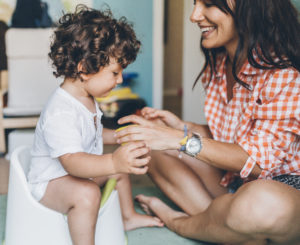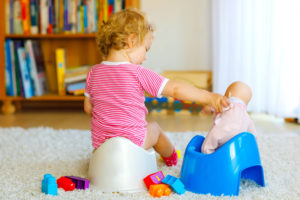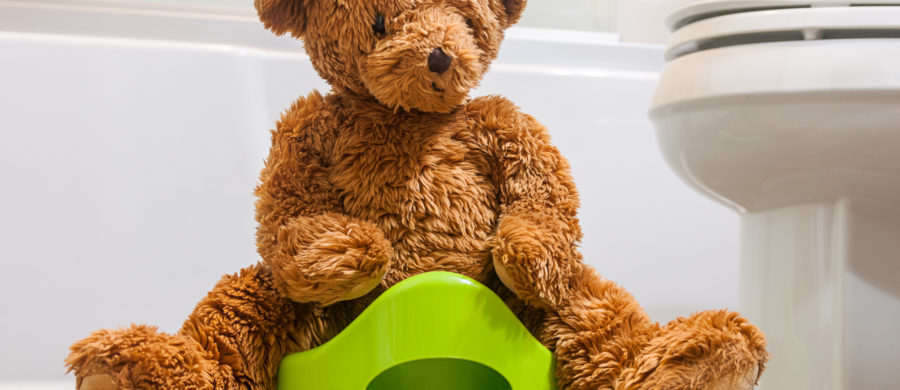Lauren Brave, MD: Taking the “Training” Out of Using the Toilet
Did you see the title of this article and immediately feel a sense of stress and anxiety? I find that any topic within pediatrics that includes the word “training”–such as sleep or potty training–affects parents in this way. The phrase implies hard work. Perhaps something challenging, competitive, to be won.

An important key to teaching your child to use the toilet is to keep it positive for both of you. Smile, smile, smile!
For these reasons, I loathe the phrase “potty training!” Helping your child use the toilet should not be approached like a CrossFit workout…full of intensity, pain, and sweat. It should not feel like boot camp. The experience should feel positive, non-confrontational, and not too effortful!
I genuinely believe that expectations for learning toilet use in our culture have become unreasonable and developmentally inappropriate for our children, and I’d like to help fix that. I hope that by the end of this article, I will have given you some tools to alleviate your stress and help your child feel comfortable using the toilet.
Most parents I speak with about teaching toilet use are already stressed. I usually first mention it at the 18-month well-child visit, as some kids have developed toileting awareness at this time. Parents have heard that they’re already behind. One of their Facebook friends already has an 18-month-old who fully uses the toilet. Their mother-in-law said they were doing it wrong. They tried a naked weekend, and it was a disaster. They think they’ve already ruined their child for life. My first objective in discussing their child’s toilet use is to diffuse the anxiety. I still find three years old to be an average age for being in full toilet use. It suits that lucky friend, but this is not most kids.
Three Keys to Toilet Learning:
- Follow your Child’s Developmental Milestones
- Keep the Process Positive
- Eliminate your Expectations
Follow your Child’s Developmental Milestones
Child development is complex and fascinating and has a wide range of normalities. This is very important to understand. The child who doesn’t have toilet awareness at 30 months is not late or behind; this child is still quite normal.
There is a popular toilet teaching method almost every parent asks me about that encourages “training” based on the child’s age and the parent’s needs, not on the child’s development. This method is one person’s opinion and not based on medical knowledge. It might work for the occasional child, but I will tell you that almost everyone tells me it was a disaster for them. If you need help recognizing your child’s developmental readiness, the American Academy of Pediatrics has a wonderful resource for parents called HealthyChildren, with some tremendous toileting articles.
Childhood development is too big a topic for one blog post, but in a nutshell, here are a few points to remember:
- Kids will first recognize the act of passing waste from their bodies after they urinate or defecate. The goal with toileting is to help them realize this body function before they need to go;
- Remember that speech development is an essential aspect of toileting, and many kids are not able to communicate their needs much before the age of three years;
- Emotional development is another massive piece of this process and is widely variable.
Keep it Positive
 The most critical aspect of toileting is staying positive. Using the toilet should only involve praise and smiles. If your child wants to sit on the toilet, do it! Read a book on the toilet, play a game, or tell a story. When urine or stool ends up in that toilet, celebrate! I love sticker charts. It is very satisfying for many kids to put a sticker on a piece of paper on the wall. Watching the stickers add up is fun. Let your child choose some stickers they like. Make the sticker chart together.
The most critical aspect of toileting is staying positive. Using the toilet should only involve praise and smiles. If your child wants to sit on the toilet, do it! Read a book on the toilet, play a game, or tell a story. When urine or stool ends up in that toilet, celebrate! I love sticker charts. It is very satisfying for many kids to put a sticker on a piece of paper on the wall. Watching the stickers add up is fun. Let your child choose some stickers they like. Make the sticker chart together.
I am not a fan of naked weekends, to be honest, and would only do this if it’s not causing stress for your child. If there is any crying or signs of anxiety, it’s not the right thing to do and has a very low likelihood of success.
As a rule, the second you see signs of stress when going to the toilet or get a “no” when asking about going to the toilet, you need to take a break.
Eliminate your Expectations
The most challenging aspect of toilet learning is eliminating expectations. Parents are often eager to get kids fully out of diapers once the process has started. The reality, however, is that this is a waxing and waning process.
I can’t tell you how many parents I see who are happily helping their kids learn the toilet. Their kid loses interest, but the parents continue to push. Two-year-olds are naturally rebellious; if their parents push them to do something they do not want, they’ll push back. This is particularly true in the potty department. Kids have very little control over anything in the world except for their bowel and bladder function. I see many 3-year-olds who are severely constipated following battling with their parents around using the toilet. I always advise to lay off the potty program when kids lose interest and pick it up again when the interest returns. It always does.
It’s true that if kids sense your urgency for them to use the potty, they will use it against you. However, there are little things you can do to steer them towards the toilet in a positive way. You can play fun activities in the bathroom. Watching things flush down the toilet is fun! Peeing on Cheerios can be a blast. If your child is resistant to stooling on the toilet, have her go in her pull-ups in the bathroom next to the toilet and flush the poop down together.
I do not have a good answer to the question of whether kids should use the toilet for specific preschool programs. This is an unfortunate requirement and has everything to do with how some preschool programs are licensed (an added licensing expense for diaper changing can be burdensome on schools) and nothing to do with normal childhood development. My advice is to work with your school. Teachers are very understanding and likely to offer guidance.
Don’t be Afraid
My take-home point is this: all children meeting “normal” developmental milestones will use the toilet in a reasonable time frame. Even kids who have developmental delays will use the toilet in their own time. Chances are that you know this but have been derailed by societal pressures, opinions offered by well-meaning loved ones, and messaging from unsubstantiated programs that promise quick success.
Don’t be afraid! Your child can do this, and so can you. Like everything else in life, positive repetition over time creates a happier and longer-lasting experience. Remember that the tortoise wins the race! Be the tortoise in your child’s toilet learning, and you’ll hopefully feel that you were able to remove the “training” from the process.
About Pediatrics at Boulder Medical Center
 The Boulder Medical Center pediatrics department is one of the largest practices in the area, with clinics in Boulder, Louisville, Longmont, and Erie, Colorado. Our board-certified pediatricians are committed to providing personal, high-quality, compassionate health care for newborns and young adults.
The Boulder Medical Center pediatrics department is one of the largest practices in the area, with clinics in Boulder, Louisville, Longmont, and Erie, Colorado. Our board-certified pediatricians are committed to providing personal, high-quality, compassionate health care for newborns and young adults.
Meet our Extraordinary Pediatrics Team
The information in this article is intended for your general knowledge only and is not a substitute for professional medical advice or treatment for specific medical conditions. You should not use this information to diagnose or treat a health problem or disease without consulting a qualified healthcare provider. Please consult your healthcare provider with any questions or concerns regarding a medical condition.

